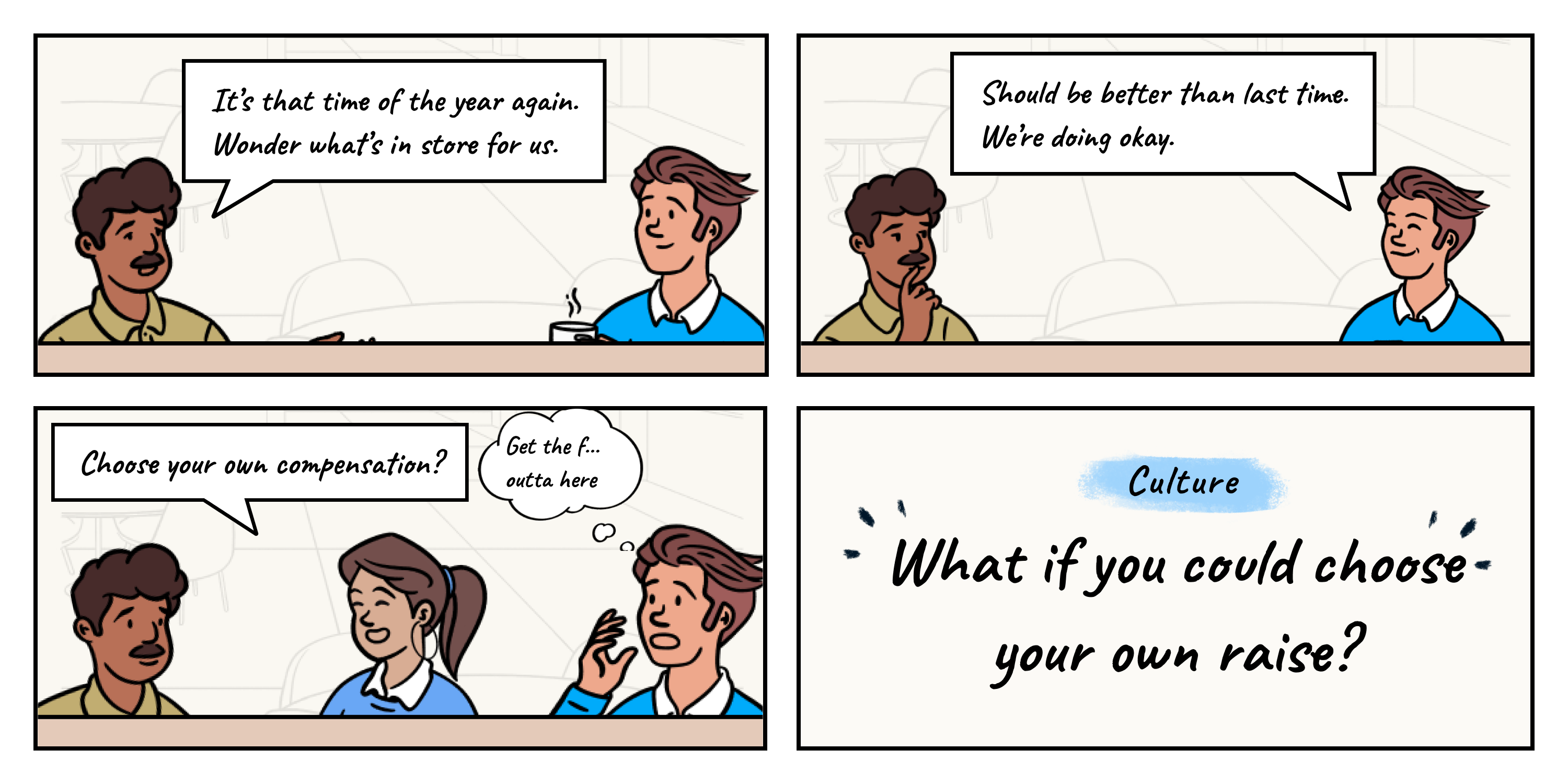
March-April marks the end and start of a financial year in India. And with that comes compensation revisions or hikes or appraisals. Call it whatever you want to but it’s bound to put a smile on every employee’s face. But here at Frappe, even more so this year.
Giving liberty a new meaning
In most companies, chances are that your manager or supervisor decides what raise you’ll get. There are fixed brackets, bands, and percentages. Fair or unfair that’s how it is and you’re either happy or unhappy with what you get. If you’ve read other Frappe blogs, you must’ve noticed that Rushabh (founder) challenges the status quo of these standard ‘company practices’ in many ways. This appraisal included.
Come this appraisal at Frappe, the person to choose your revised compensation was… wait for it… yourself! That’s right, everyone at Frappe was given a chance to choose their own compensation by submitting a statement of purpose (SOP) for a raise. This SOP had to include achievements, downfalls, plans, and some data.
I too submitted mine, some people chose not to. Then, the Frappe Leadership Council (FLC) reviewed all the SOPs where most of them seemed fair and were passed. A calmer process than last year.
Why does this work?
Openness is something Frappe believes not just in software but also in company culture. Everyone within the company has access to all company data. This includes financials, other’s salaries, other team’s plans, and so on. This is to say that everyone knows how much the company is making and how much raises it can afford. Of course, not all of the money is for raises, there was a budget. But a bigger than a regular one this time.
When Rushabh proposed this idea, not everyone was in favor. There were some skeptics who wanted their immediate senior to decide. I too was one of the skeptics. I thought, obviously I can’t demand something absurd like a 10X raise, and felt confident in my immediate senior’s (Rushabh right now) judgment. But he wanted to really implement this novel idea of people being able to choose their own pay. A few team discussions in, everyone seemed to agree and knew what was coming. SOPs were submitted, the FLC did their thing and everything was finalized.
How did it fare?
Most people got what they wanted, some chose 0—of course, the FLC came up with a fair number for them, and some quoted a number too high, yours truly included. Here too, Rushabh said that if some people are quoting a high number let them but let them also give a future commitment to justify that number. While I was expecting moderation, I was baffled by what he said and thought to myself where else would something like this happen.
But in the end, others in the council objected saying that this wouldn’t be fair to others. While I partly wanted the former to happen, the latter is what happened and I believe for everyone’s good. Some people’s compensation ask was moderated to make it fairer.
The reveal
After all this, everyone’s compensation was made public. I too scrolled through the list like everyone else to see what other people are getting paid. In cases like this, two things happen—you either get jealous or unsettled looking at what other people get which is unfortunately too common, or you feel okay, happy even. There was a poll later and it said that almost 90% of people were happy with their new pay. Well, of course, people got to choose it after all. I thought that mine could’ve been a little higher, that is until I scrolled through the list which is when I found a new appreciation for how I’m valued.
Let me tell you why. Between us, I was kind of having a slow-paced last couple of weeks. Even so, I was treated fairly, even generously when it came to compensation. While some factors make me valuable, they weren’t a ticket to take it easy. My takeaway was that it’s easy to think ‘oh my market value could be so much and I deserve more’ because of some reasons and a different thing to not ride on shiny achievements, to roll up your sleeves, and do good work; high quality, consistent work that makes you proud. Better compensation should naturally follow.
If you want to know what happened during last year’s appraisals, check out Rushabh’s blog post on it. It’s a cool experiment to see team cohesiveness and people’s mindset when the team is small, say around 20 people but in a larger team, it’s a recipe for chaos. Not recommended.
Conclusion
This year, in the end, most seemed happy, the average raise was a substantial percentage and everyone was shown that they’re appreciated. There was some unsaid notion about fairness and faint questions about this being more systematic. But I bet being rigid and ‘fixed’ will bring a new emotion in the picture called unhappiness. And this process has avoided just that with a high success rate.
Most times, I don’t find myself nodding to Rushabh’s approach to these kinds of decisions in which he insists on using first principles. There are already proven frameworks that work. So why bother? I used to think. But this time it was different, not because it gave me the freedom to propose what I should be paid. Because the degree of trust and liberty moved me.
In a world where companies talk a big game about equality and inclusion in decision making and casually put a red tape when it’s convenient, it’s a good opportunity for us to take a step back and appreciate the culture and freedom, unlike any other I’ve seen or heard of.
As I finish this post, I wonder, which other company is crazy enough to do something like this.




·
The organization and people working need to be matured to take such bold decision, really amazed to see such appraisal!!!